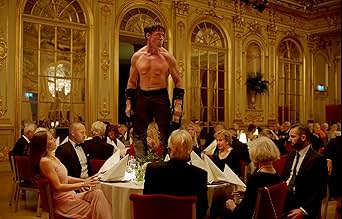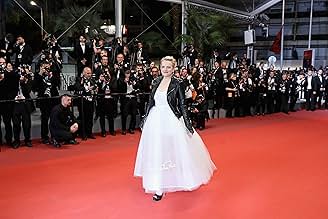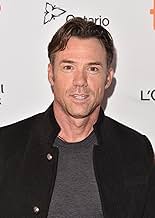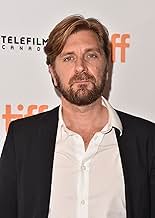O principal curador de arte do prestigiado museu de Estocolmo está em tempos de crises profissionais e pessoais enquanto tenta organizar uma nova e controversa exposição.O principal curador de arte do prestigiado museu de Estocolmo está em tempos de crises profissionais e pessoais enquanto tenta organizar uma nova e controversa exposição.O principal curador de arte do prestigiado museu de Estocolmo está em tempos de crises profissionais e pessoais enquanto tenta organizar uma nova e controversa exposição.
- Indicado a 1 Oscar
- 33 vitórias e 46 indicações no total
Avaliações em destaque
Like almost everyone else reviewing here, my wife and I found this way, way too long. Maybe 45 minutes too long. Maybe an hour.
Scene after scene we found ourselves remarking to each other, "what was the point of that?" Just one example: the scene with the ape street performer ran for something like 7-8 minutes. We thought it could have been done in a fraction of that and nothing would have been lost. Then I later thought they could have done without it entirely and I'm not sure anything would have been lost.
The scene with the museum director given the speech on the steps of the foyer? What was the point? What did it add? Nothing that we could see.
Scene after scene we turned to each other and asked the same question.
So instead of being a tight 1:30 to 1:45 movie, this ran on for a tedious 2 and a half hours.
I have a personal rule of thumb when it comes to films. Movies that are written and directed by the same person are so often self-indulgent. I'm going to have to amend that to: movies written, directed and edited by the same person are invariably self-indulgent and way too long.
A good director here would have told the writer what was wrong with the script and suggested what needed to be rewritten. A good editor would have gone back to the director and told him that it was running too long and that by cutting this or that that the result would have been better.
Unfortunately this film has, needless to say, the same person in all three roles. and as a result, it's way too long and was just tedious.
Sorry, but I just don't understand the rave reviews some have given this. Yes, this is ALMOST a good film. But only ALMOST.
Scene after scene we found ourselves remarking to each other, "what was the point of that?" Just one example: the scene with the ape street performer ran for something like 7-8 minutes. We thought it could have been done in a fraction of that and nothing would have been lost. Then I later thought they could have done without it entirely and I'm not sure anything would have been lost.
The scene with the museum director given the speech on the steps of the foyer? What was the point? What did it add? Nothing that we could see.
Scene after scene we turned to each other and asked the same question.
So instead of being a tight 1:30 to 1:45 movie, this ran on for a tedious 2 and a half hours.
I have a personal rule of thumb when it comes to films. Movies that are written and directed by the same person are so often self-indulgent. I'm going to have to amend that to: movies written, directed and edited by the same person are invariably self-indulgent and way too long.
A good director here would have told the writer what was wrong with the script and suggested what needed to be rewritten. A good editor would have gone back to the director and told him that it was running too long and that by cutting this or that that the result would have been better.
Unfortunately this film has, needless to say, the same person in all three roles. and as a result, it's way too long and was just tedious.
Sorry, but I just don't understand the rave reviews some have given this. Yes, this is ALMOST a good film. But only ALMOST.
American reporter Anne (Elisabeth Moss) interviews Christian (Claes Bang), the curator of an avantgarde modern art museum in Stockholm. His phone and his wallet get stolen by a crew of pickpockets. His assistant Michael helps track the phone and suggests sending threatening letters to all the apartments within the phone's location. Christian does it and faces unexpected consequences.
The scheme is actually quite clever and it works in the movie. Christian is very frustrating in the politically correct way. He is off-putting but that's the point. He could easily fix the problem with the kid but he's too scared of him. It would be more understandable if the kid is a teenager. It's silly and shows his lack of a backbone. There are a couple of amazing scenes and there are quite a few filler scenes in two and a half hours. It definitely could be cut down to two hours. The Tourette's scene is fun. Moss has a couple of great scenes and she's the best actor in the movie. This is not a movie to root for the guy but also not to root against him. It's not really a comedy or that intense as a drama. It's a movie of frustration at all of his fallibilities. It is great at painting a picture of a man trying to be good but lacks the courage to be truly good when backed into a corner.
The scheme is actually quite clever and it works in the movie. Christian is very frustrating in the politically correct way. He is off-putting but that's the point. He could easily fix the problem with the kid but he's too scared of him. It would be more understandable if the kid is a teenager. It's silly and shows his lack of a backbone. There are a couple of amazing scenes and there are quite a few filler scenes in two and a half hours. It definitely could be cut down to two hours. The Tourette's scene is fun. Moss has a couple of great scenes and she's the best actor in the movie. This is not a movie to root for the guy but also not to root against him. It's not really a comedy or that intense as a drama. It's a movie of frustration at all of his fallibilities. It is great at painting a picture of a man trying to be good but lacks the courage to be truly good when backed into a corner.
A clever, and insightful, but somewhat meandering, social satire that, in hindsight, feels more like a series of vignettes loosely connected by the films protagonist, a well-known museum curator. The satirical sections that focus on the Modern Art world are dead on, although with, perhaps too much restraint. For the most part they are so understated you might find yourself wondering if the filmmakers were intentionally being satiric; except for, obviously, the film's high-point "Welcome to the Jungle" - both its most humorous and chilling sequence - which literally has a punchline at the end. It could easily be argued the film is worth watching for this section alone. Primarily concerned with how individuals interact with society and the world around them, scenes often play out with the camera focused on one character's reaction as opposed to the action, or conversation, occurring off-screen. This can be a disorienting choice, and, at times, confusing, yet undoubtedly all that is intentional. But be warned, the film will make no attempt to tie up all its lose ends: some characters just drop out of sight, storylines are left dangling and the movie just comes to a stop as opposed to having a real climax. You can be left feeling poked and prodded by the film for having watched it, as opposed to rewarded. But, hey, it's Art.
Director Ruben Ostland has followed up his 2014 Golden Globe nominee Force Majeure with Cannes Palme d'Or winner The Square. The film is both a satire of the cultural elite of Stockholm and a sad commentary about the separation between individuals both within circles and between circles. The lead character, Christian (Claes Bang), is the curator of a museum of modern art that seeks to draw attention and donors through avant-garde exhibits and over-the-edge social media campaigns. The film follows Christian through a few weeks of his life when one of the hot new exhibits is "The Square", an actual square in the museum courtyard that is meant to be "a sanctuary of trust and caring." But rather than show trust and caring, the movie The Square raises a number of troubling questions: How thin is the veneer of civilization? Can political correctness substitute for empathy? Is art whatever a curator chooses to put in an art museum? And enveloping these questions is the separation of the circle of Stockholm's cultural elites from the City's homeless and immigrant population, as well as the separation of individuals within the City's cultural elite. One set piece in particular portrays the inability of the Stockholm's elite to communicate on a human level: It is Christian's meeting with Anne (Elisabeth Moss), a publicist, the day after a night of sex—and a bizarre argument over what to do with a used condom. In this scene Christian is totally unable to say the needed words about what had happened between them. (Anne, an American, comes across as much more able to relate to others than any of the Swedes in the movie.) Another memorable scene is the one in which a banquet for museum donors is interrupted when the performer (Terry Notary), playing an ape, goes out of control. The diners, who are initially frozen by their need for decorum, or perhaps by their need to display political correctness, ultimately go ape themselves. Perhaps not a total surprise since the same donor diners had earlier stampeded their way to a luncheon in a lighter scene. There are many sub-plots in the film—some satirizing interactions within Stockholm's upper class, others between classes— perhaps leaving some viewers displeased by the way the film jumps without warning from one set piece to another. Others may dislike long stretches of art-film inactivity in many of the episodes—something that explains why the movie lasts for 2 hours and 22 minutes. Nevertheless, The Square does capture the alienation of modern society, and does it with plenty of dark humor.
Hard to classify this movie, after watching it at the New Zealand International Film Festival just a few hours ago.
Humorous? Certainly. In some moments even hilarious. Yet, this movie has some very u-boat layers to its seemingly light-hearted making-fun-of-arts theme. Even though it is tempting, I am not going to be an artsy-fartsy-smartarse trying to deliver a holistic explanation of this flick (all I'm saying is: "Swedish society" and "human nature").
The acting is superb and sometimes massively ("Oleg-style") impressive.
My only criticism is that the movie is too long. Clipping some minutes here, and some minutes there, would have streamlined the viewing experience.
A complex movie. Recommended to watch whenever you have some spare brain capacity at hands. ;-)
Humorous? Certainly. In some moments even hilarious. Yet, this movie has some very u-boat layers to its seemingly light-hearted making-fun-of-arts theme. Even though it is tempting, I am not going to be an artsy-fartsy-smartarse trying to deliver a holistic explanation of this flick (all I'm saying is: "Swedish society" and "human nature").
The acting is superb and sometimes massively ("Oleg-style") impressive.
My only criticism is that the movie is too long. Clipping some minutes here, and some minutes there, would have streamlined the viewing experience.
A complex movie. Recommended to watch whenever you have some spare brain capacity at hands. ;-)
Você sabia?
- CuriosidadesThe crowd Oleg was taunting in the dinner scene, throwing water over and pushing around, were in fact drawn from the actual ranks of Sweden's 1 percent, including some of the country's wealthiest art patrons ("They were so into it," Terry Notary said).
- Erros de gravaçãoIn the closing titles of "The Girl With A Kitten" clip, the Hebrew version is wrong: the English noun "square" appears in Hebrew as "an open space in a city" rather than "rectangle with all sides equal").
- ConexõesFeatured in 75th Golden Globe Awards (2018)
- Trilhas sonorasNo Good (Extended Mix)
Performed by Fedde Le Grand, Ossama Al Sarraf and Ned Shepard (as Sultan + Shepard)
Written by Ossama Al Sarraf, James Bratton, Kelly Charles, Robin Morssink, Fedde Le Grand and Ned Shepard
Principais escolhas
Faça login para avaliar e ver a lista de recomendações personalizadas
- How long is The Square?Fornecido pela Alexa
Detalhes
- Data de lançamento
- Países de origem
- Centrais de atendimento oficiais
- Idiomas
- Também conhecido como
- The Square. La farsa del arte
- Locações de filme
- Empresas de produção
- Consulte mais créditos da empresa na IMDbPro
Bilheteria
- Faturamento bruto nos EUA e Canadá
- US$ 1.502.347
- Fim de semana de estreia nos EUA e Canadá
- US$ 74.233
- 29 de out. de 2017
- Faturamento bruto mundial
- US$ 8.588.030
- Tempo de duração
- 2 h 31 min(151 min)
- Cor
- Mixagem de som
- Proporção
- 1.85 : 1
Contribua para esta página
Sugerir uma alteração ou adicionar conteúdo ausente




















